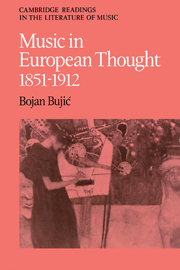Book contents
- Frontmatter
- Contents
- Preface
- Acknowledgments
- List of abbreviations
- General introduction
- Part I German aesthetics of music in the second half of the nineteenth century
- Part 2 Aesthetics of music in France and England
- Part 3 Music and positivist thought
- Part 4 Bridge between music theory and philosophy and the beginnings of musicology as an independent discipline
- Part 5 New tendencies at the turn of the century
- Select bibliography
- Index
Part 5 - New tendencies at the turn of the century
Published online by Cambridge University Press: 05 February 2012
- Frontmatter
- Contents
- Preface
- Acknowledgments
- List of abbreviations
- General introduction
- Part I German aesthetics of music in the second half of the nineteenth century
- Part 2 Aesthetics of music in France and England
- Part 3 Music and positivist thought
- Part 4 Bridge between music theory and philosophy and the beginnings of musicology as an independent discipline
- Part 5 New tendencies at the turn of the century
- Select bibliography
- Index
Summary
Introduction
The ever-increasing impact of the exact sciences on psychology, philosophy and aesthetics evident throughout the second half of the nineteenth century produced in its turn a reaction against the domination of humanistic disciplines by scientific modes of thought. The reaction, which was evident in the work of several philosophers and influential intellectual figures, could be divided into two streams: in the one are to be found the philosophers whose ideas took a long time to assert themselves, while in the other stand those whose presence was initially felt quite strongly although later their importance appeared to decline. Edmund Husserl belonged to the first stream, and, as it was only in the 1920s that phenomenology extended itself to aesthetics in the works of Moritz Geiger, Roman Ingarden, and Nicolai Hartmann, this group stands outside the scope of this volume. A more immediate impact was made by two representatives of the second group, Wilhelm Dilthey and Max Dessoir. At first the influence of the former was felt largely through his lectures, as some of his important writings became accessible only after his death.
In the case of Dilthey non-German speakers are confronted by a difficulty characteristic of nearly all German philosophical writing of the last hundred or so years. Dilthey, like Husserl, and later Heidegger, uses a specially constructed terminology and gives individual words specific meaning often extremely difficult to render into English adequately.
- Type
- Chapter
- Information
- Music in European Thought 1851–1912 , pp. 363 - 394Publisher: Cambridge University PressPrint publication year: 1988

